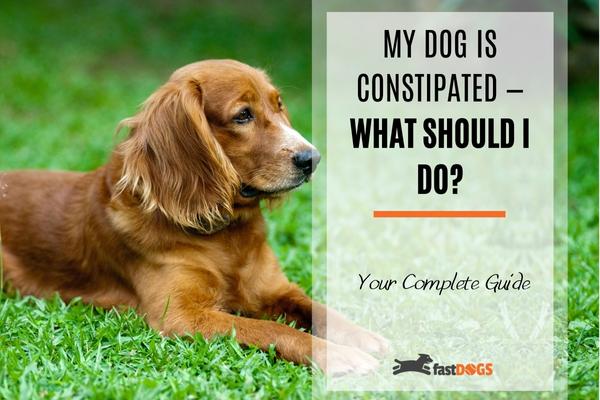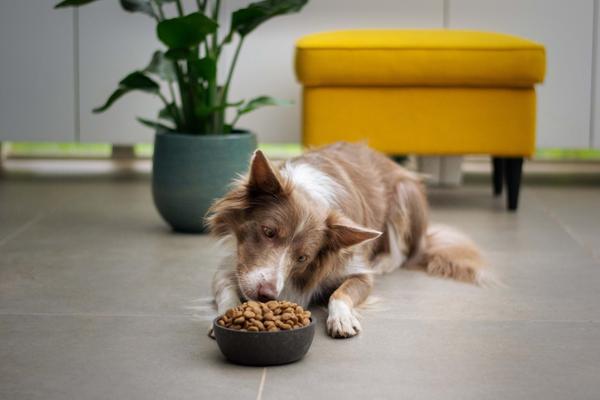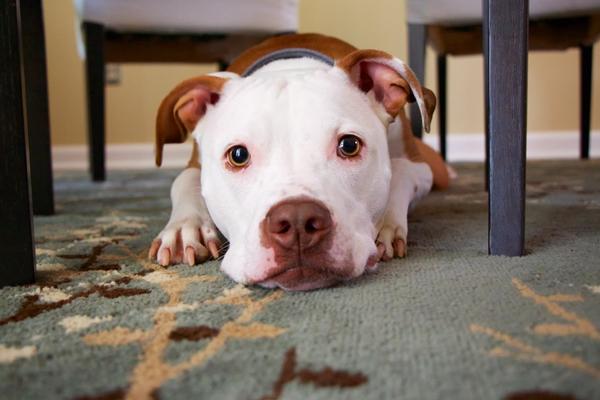My Dog Is Constipated — What Should I Do?

My Dog Is Constipated — What To Do
Have you been out for walkies and noticed a lack of activity from your doggy’s rear end? Are you thinking, my dog is constipated, what should I do?
Constipation is not only a problem for humans but also a burden for dogs. And while this condition can often be resolved via home remedies, it can also be a sign of something more serious.
We’ve put together this guide to help you understand the symptoms, causes, and how to treat constipation in dogs.Dog Constipation Symptoms
Constipation in dogs is usually fairly easy to spot: The primary sign is a reduction in ‘normal’ bowel movements or passing nothing at all for a couple of days.
Other symptoms include:
Dogs often assume the typical ‘squatting position’ and push, but nothing comes out. They may also make several attempts to poop to no avail.
If your canine manages to defecate, feces will appear very dry and firm — not the typical ‘sausage shape.’ Instead, it’s often a matter of individual, small hard balls.
In some cases, there may be blood or mucus in the stool or the anus.
Pooches with chronic constipation may experience fluid leaking from the anus when defecating. This can be confused with diarrhea, but it’s a liquid produced by the irritated intestine in response to the hard stool.
Dogs suffering from severe and/or persistent constipation may also show the following symptoms:
Loss of appetite.
Vomiting.
Weight loss.
Lack of interest.
Tiredness.

Why Is My Dog Constipated?
When pooping is regular/normal, food works its way through the digestive tract to where it’s finally excreted.
When reaching the colon, fluids and nutrients are taken. However, if the feces cannot be excreted normally during this process and remains in this part of the digestive tract for too long, the colon continues absorption. As a result, stools will be hard and dry, making it difficult for the dog to defecate smoothly.
So what causes dog constipation? We list some common reasons:
Diet Related
A diet deficient in fiber is likely the main offender of constipation in canines. This non-nutrient cannot be digested by the body, but it bulks out poop and is responsible for keeping things moving in the GI tract.
If your dog is partial to a bone, you may want to curb that. Overindulging can cause constipation. There is even talk of ‘bone excrement.’
Changes in diet may also cause constipation in dogs. So, in addition to choosing high-quality dog food, when altering meals, you should also switch it slowly, so that your dog can adapt accordingly.
Ingestion of Foreign Bodies
We all know dogs love to chew — shoes, toys, you name it, if it's within reach, to a dog, it’s fair game. Eating these non-food foreign objects will also make your dog constipated, potentially leading to an intestinal blockage.
Dog Age
Older dogs are more prone to constipation than younger dogs because of the progressively reduced bowel function.
Lack of Exercise
If you don’t take your pooch out regularly for walkies, it will lead to slow gastrointestinal motility and constipation problems. What’s more, your dog could also become overweight, as well as cause other health problems.
Metabolic or Other Diseases
Dog constipation can be a side effect of abnormal metabolic functions such as hypothyroidism (underactive thyroid) and kidney problems.
Stress and Mental Illness
Changes in life, such as boarding, traveling, having a new member or pet at home, etc., can also bring on stress for your bow-wow, leading to constipation.
Dehydration
If your dog doesn’t drink enough, the intestinal absorption rate remains constant. This will naturally make the stool too hard, making it difficult to defecate, and cause constipation.

What Can I Do if My Dog Is Constipated? How To Improve?
If you think your pooch needs a hand to get things moving along again, here are a few dog constipation home remedy pointers to try:
How To Relieve Constipation in Dogs Tips:
- Make sure your dog drinks enough: Ensure fresh water is readily available and encourage your pooch to drink more. Dogs who often eat kibble or dry food may want to switch to wet food to increase moisture content in their meals.
- Offer fiber-rich foods: For example, pumpkin, bran, broccoli, apples, and cabbage. These foods will help gastrointestinal motility.
- Try a natural laxative for dogs: Mixing a little olive oil or coconut oil into their dinner may help soften the stools.
- Increase exercise time: Encourage your dog to move more. Activity promotes digestive mobility, makes dogs feel better, and avoids obesity.
- Massage the belly: Using a circular motion, gently massage your dog’s belly. But don’t press too hard, it may cause discomfort.
- Groom your dog: If you have a long-haired pooch, brush them at least once a day to prevent your pooch from accidentally eating its own hair.
- Observe the diet and defecation status: Prevent your dog from eating garbage, bones, etc., and closely track the status of dog defecation.
- Supplement with dog-friendly probiotics: Probiotics are ideal for restoring the balance in the gut.
If you don’t notice an improvement, contact your vet. They may suggest a dog constipation treatment like an oral stool softener for dogs or a dog laxative to promote fecal excretion. Do not give your dog medication or treatment meant for humans — without an initial consultation with your vet.

What to Do If Your Puppy is Constipated?
Compared to adult dogs, diarrhea is more common in young pups, but it doesn’t mean it can’t happen. For example, a puppy can’t poop by themselves until they’re around three weeks old. It’s mom’s job to help them pee and poop up until that time.
So, how to make a puppy poop when constipated?
Hydrating your puppy is essential, younger dogs can go downhill very quickly as a result of the lack of food or water.
For fur babies over four weeks, canned pumpkin offers a boost in fiber. This will help soften stools and make it easier for your pup to pass poop.
When Should You Take a Constipated Dog to the Vet?
As mentioned, if your dog hasn't pooped for one to two days or even three days, take your dog to your vet for a checkup. In puppies, seek help after 24 hours.
Long-term or chronic constipation can lead to the accumulation of dry stools in the colon — obstipation. In simple terms, your dog won’t be able to pass a poop without help. This may require surgical intervention.
Questions your vet may ask include:
The last time your pooch pooped normally.
Color and status of recent bowel movements.
Eating habits.
When/if your dog has eaten a foreign object.
Whether the hind legs are weak or tired when walking.
Is there any possible trauma or illness?
Are there any other symptoms such as lethargy, decreased appetite, vomiting, etc?
Final Thoughts
While in most cases this condition is temporary and usually resolves itself, constipation can be a symptom of something more sinister.
There are a number of causes and plenty of dog constipation remedies you can try at home — as well as conventional treatments. However, you must contact your vet if the problem persists.
So, if you find yourself saying, ‘My dog is constipated!’ — there’s no need to panic, your pooch’s poop problem won’t be such a pain in the butt to resolve.My Dog Is Constipated FAQs
How Can I Stimulate My Dog to Poop?
Rub your dog's abdomen to stimulate pooping. Begin by standing your dog up and rubbing behind their rear leg. Your dog may kick the hind leg — continue to rub until the tail rises. Then, lie your dog down and massage their left side for a few minutes.
You can also try holding an ice cube on their butt hole — don’t forget gloves for this one.
How Does a Dog Act When Constipated?
They will most likely try to excrete poop numerous times without results. You might notice your dog spinning incessantly, squatting often, or perhaps even whining in extreme situations.
How To Tell if Your Dog Is Constipated?
Dog constipation is defined as the lack or infrequent passing of poop.
How Long Can a Dog Go Without Pooping?
If your dog skips a day every now and then, it's not a cause for concern, particularly if, indeed, the poop appears normal. It’s recommended that you call your veterinarian after 48-72 hours without a bowel movement. It could be an indication of a major health problem.
How Can I Soften My Dog’s Stool Naturally?
Consider using pure canned pumpkin or pumpkin powder. Canned, also known as wet food, has a high moisture content, which may aid system regulation. Olive oil, wheat bran, and ginger are examples of foods and herbs that may be beneficial.
When Should I Worry About Why My Dog Is Not Pooping?
Dogs' constipation should not be neglected because it can escalate to critical complications if left untreated. If your dog hasn't pooped for two days or your puppy for one, consult with your vet.
What Laxatives are Safe For Dogs?
There are several laxatives available for the health of dogs. However, not all are considered safe. Natural stool softeners such as coconut oil, olive oil, and possibly pumpkin can help with dog constipation relief, allowing your pup to pass poop more easily.
If your pup's constipation symptoms persist, it’s best to seek a vet-prescribed dog-friendly laxative — rather than risk giving your pup one meant for humans.
